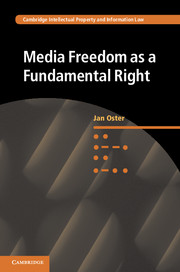Book contents
- Frontmatter
- Contents
- Preface and acknowledgements
- Table of cases
- Treaties, Conventions, Declarations and Statutes
- Reports and other documentary sources
- Introduction: aim, scope and method
- Part I The theoretical foundations of media freedom
- Part II General rules on media freedom
- Part III Specific limitations to media freedom
- 7 Personality rights and intellectual property as ‘rights of others’
- 8 Threats to public order interests: national security, territorial integrity, public safety and prevention of disorder and crime
- 9 The protection of health and morals
- 10 Maintaining the authority and impartiality of the judiciary
- 11 Incitement to hatred
- 12 Religiously offensive publications
- 13 Restrictions on commercial publications
- 14 Media pluralism
- Conclusion: tenets of a Media Freedom Principle
- Bibliography
- Index
- Cambridge Intellectual Property and Information Law
8 - Threats to public order interests: national security, territorial integrity, public safety and prevention of disorder and crime
from Part III - Specific limitations to media freedom
Published online by Cambridge University Press: 05 June 2015
- Frontmatter
- Contents
- Preface and acknowledgements
- Table of cases
- Treaties, Conventions, Declarations and Statutes
- Reports and other documentary sources
- Introduction: aim, scope and method
- Part I The theoretical foundations of media freedom
- Part II General rules on media freedom
- Part III Specific limitations to media freedom
- 7 Personality rights and intellectual property as ‘rights of others’
- 8 Threats to public order interests: national security, territorial integrity, public safety and prevention of disorder and crime
- 9 The protection of health and morals
- 10 Maintaining the authority and impartiality of the judiciary
- 11 Incitement to hatred
- 12 Religiously offensive publications
- 13 Restrictions on commercial publications
- 14 Media pluralism
- Conclusion: tenets of a Media Freedom Principle
- Bibliography
- Index
- Cambridge Intellectual Property and Information Law
Summary
Media freedom is based on the idea that a free and open discourse on matters of public concern is more conducive to a democratic society than the suppression of unpalatable speech. Freedom of expression and media freedom do not only protect information and ideas that are favourably received or regarded as inoffensive or as a matter of indifference, but also those that offend, shock or disturb the state or any sector of the population. Because of its dominant position in public discourse, the government especially has to abstain from interfering with media freedom via governmental channels of communication.
Nevertheless, in their capacity as guarantors of public order, state authorities must be able to adopt measures to react appropriately to remarks which themselves overstep the boundaries of civilised discourse by threatening public order. Therefore, Article 19(3)(b) ICCPR and Article 13(2)(b) ACHR allow restrictions on freedom of expression for the protection of national security or public order. Similarly, Article 27(2) AfCHPR requires that the rights and freedoms of each individual shall be exercised ‘with due regard to collective security … and common interest’. Although the notion of ‘public order’ is not expressly provided by Article 27(2), it is included in the term ‘common interest’. Finally, Article 10(2) ECHR may justify an interference in the interests of national security, territorial integrity or public safety, and for the prevention of disorder or crime. Further interests related to public order will be discussed in separate chapters: the protection of health and morals (Chapter 9), the authority and impartiality of the judiciary (Chapter 10), the prevention of incitement to hatred (Chapter 11) and of religiously offensive publications (Chapter 12).
The notion of ‘public order’
The concept of ‘public order’ encompasses fundamental interests the state needs to preserve in order to guarantee public safety and to protect the interests of society as a whole.
- Type
- Chapter
- Information
- Media Freedom as a Fundamental Right , pp. 193 - 211Publisher: Cambridge University PressPrint publication year: 2015



